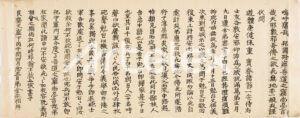Kim Yeong-sang (1836–1911) was a Confucian scholar and independence activist from Jeongeup, Jeollabuk-do, during the late Joseon period.
When the Eulsa Treaty was forcibly signed in 1905, he joined the Taein Uibyeong (righteous army) alongside Choi Ik-hyun and Im Byeong-chan.
In 1906, he led the uprising at Museong Seowon, serving as the chief strategist and rallying local Confucian scholars to participate in the movement.
In 1910, after Japan forcibly annexed Korea and offered pension money to elders,
Kim Yeong-sang refused, stating, “How can the people of Korea accept money from their enemy?”
He repeatedly rejected the offer and tore up the official document with his name on it. In 1911, he was arrested for insulting the Japanese emperor and taken to the military police in Donggok.
While being transported to Gunsan, he attempted to commit suicide by jumping into the Mangyeong River but was rescued by military police.
Imprisoned in Gunsan, he went on a hunger strike and died at the age of 76. He was later honored as an independence activist.

